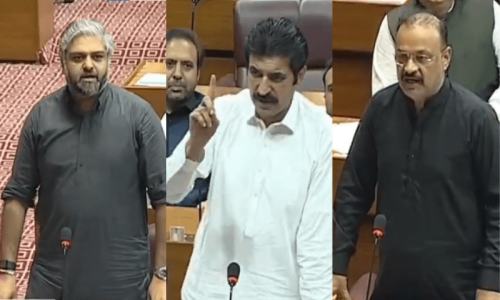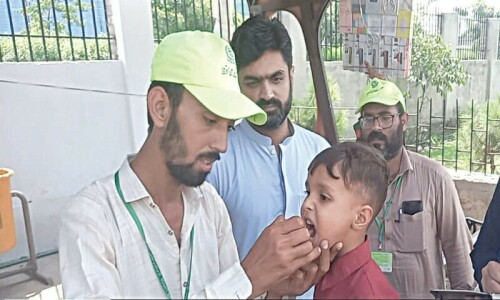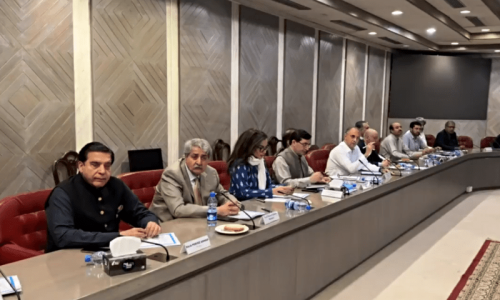ISLAMABAD: Rumours that the water in Rawal Dam had been poisoned earlier this month have triggered a debate on whether the water supplied to the twin cities is safe, and what the consequences would be if the water in the Khanpur, Simly and Rawal dams was poisoned.
On July 15, the water supply from Rawal Dam to Rawalpindi was suspended because of fears that the water had been contaminated after a number of fish were found dead in the water.
Samples of the water were tested by the Pakistan Council of Research in Water Resources (PCRWR) and the National Institute of Health (NIH), while samples of the dead fish were sent to the Punjab Forensic Science laboratories in Lahore and the National Agricultural Research Council (NARC).
The chairman of the Senate Standing Committee on Climate Change, Mir Mohammad Yousaf Badini, also took notice of the incident.
The Secretariat police have registered a case due to rumours that the water was poisoned, allegedly because of a dispute between local fishermen and a contractor that won an auction for fishing rights in the area late last year.
The water was declared suitable for consumption a day later, and its supply to Rawalpindi was restored.
Shahid Nazir, an I-10 resident, told Dawn used to collect water from the supply line, and the water was used for drinking after they boiled it.
“However, after the Rawal Dam incident, my wife was scared and stopped getting drinking water from the supply line. I tried to persuade her that we should start getting water from the filtration plant, but she was not ready to do that, so we have started buying [19 litre bottles] of water from a private company. I think I will require around four such bottles a week, so it will cost me around Rs3,500 per month,” he said.
Mr Nazir is not the only one who has stopped drinking water from the supply lines. Mohammad Hameed, another Islamabad resident, said he used to use bottled water for drinking, but has now decided to use bottled water for cooking as water from the supply line could be dangerous if it has been poisoned.
Environmentalist Dr Mohammad Irfan, who is also a professor at the International Islamic University, told Dawn he visited the Sangjani water filtration plant in Ramazan with his students.
“It was a state of the art filtration plant gifted by Japan, which had computerised readings and was capable of getting all sorts of water readings. We don’t have to worry because the plant has the best monitoring system for water. Its chlorination is being done. However, there is a need to install reverse osmosis plants in different sectors from where water is pumped to houses.
When asked about the dead fish, Dr Irfan said fish cannot survive if the oxygen level in water increases past 12 parts per million (PPM) or falls below 7PPM.
“Dead fish can be easily observed in the Kunhar River near Naran and the upper areas, because the oxygen level increases in the water when water falls from mountains. Here I believe the oxygen level decreased, because fish start bleeding from the kills if the oxygen level rises. Moreover, the silver cord fish, which died, was a fish found in running water but it was being farmed in the dam deliberately,” he added.
Dr Irfan said a number of times, a large number of fish die because of diseases, just like hens suddenly die because of diseases.
He added that the oxygen level in water also decreases because of pollution, as bacteria and other microorganisms increase in polluted water which absorb oxygen.
Water and Sanitation Authority Rawalpindi spokesperson Omer Farooq told Dawn the water filtration plant used to supply water to Rawalpindi is fixed in Chak Shahzad.
“It is a state of the art plant, and the quality of water is checked from time to time and it is made sure that the water should be supplied as per the World Health Organisation’s standards.
“Moreover, citizens do not have to worry as there is a proper system of water security and even if someone poisons the water he has to mix many trucks of poison because of the huge quantity of water in the dam,” he said.
He said Green Leaf Technology is used to filter water at the Sangjani filtration plant, while Rapid Sand Filter technology is used at Rawal Dam.
“The plant installed in Rawal Dam is a 1962 Austrian-made model. It has been upgraded twice. Last time, it was upgraded by an Austrian team in 2003-4. A number of methods are adopted to ensure the quality of water, and the quality of water tested frequently so people do not have to worry about it.”
He said the plant has a capacity of 28 millions gallons of water daily (MGD), and filters 23MGD.
He added that the only problem is the mixing of contaminated water with the water in the dam, and this matter has been taken up by Wasa in the Supreme Court and with the Capital Development Authority (CDA) to stop the supply of contaminated water from various colonies in the dam.
CDA spokesperson Mazhar Hussain said the CDA’s filtration system is up to the mark, and arrangements have been made to check water quality frequently.
“The water is provided according to WHO standards, and there is no threat even if, for the sake of argument, someone mixes poison in the water,” he said. He added that a number of steps have been taken, such as the installation of sewerage treatment plants, to stop the supply of contaminated water in Rawal Dam.
In July 2009, then SC chief justice Iftikhar Chaudhry took suo motu notice of contaminated water in Rawal Dam, and called all the stakeholders. A number of hearings were held, but the water contamination issue has not been resolved to date.
Published in Dawn, July 31st, 2017













































